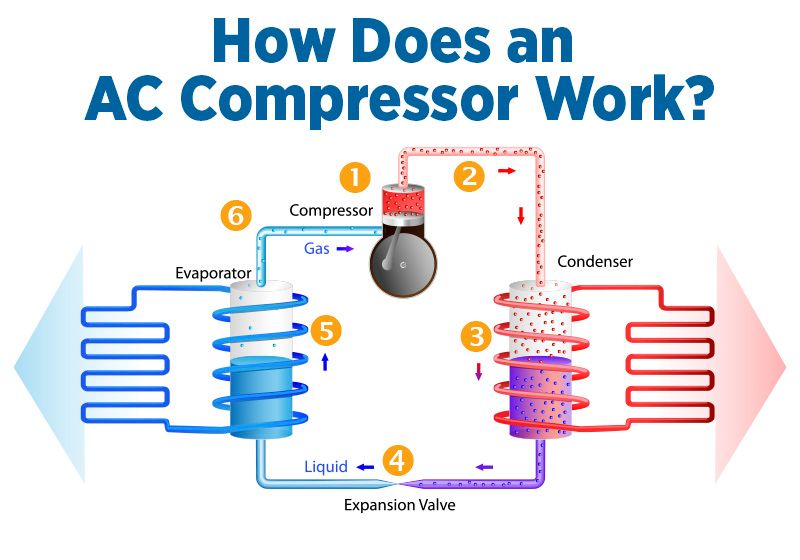If you’ve ever wondered what keeps your home cool on a hot summer day, the answer starts with your air conditioning system. More specifically, it starts with your air conditioner’s compressor. The AC compressor is often called the heart of your cooling system, and with good reason. It’s responsible for moving refrigerant through the system and enabling the entire cooling process to happen. Without it, your air conditioner simply won’t be able to work.
In this article, we’ll explain what an AC compressor is, what it does, how it works, the signs that it may need repair, how long it typically lasts, and what you can do to maintain it for years to come.
What Does an AC Compressor Do?
At its core, the AC compressor is designed to circulate refrigerant through your air conditioning system. It takes low pressure refrigerant gas from the evaporator and compresses it into a high pressure and high temperature gas. This transformation is essential for heat exchange to occur, which is how your AC system removes heat from inside your home and releases it outside.
In simple terms, the compressor plays a vital role in keeping your home cool and comfortable. Without it, the refrigerant wouldn’t be able to flow, and the cooling process would stop altogether. That’s why the compressor’s function is so crucial in any HVAC system.
How Does an AC Compressor Work?
To understand how your AC’s compressor works, it helps to look at the overall cooling cycle. Here’s a simplified breakdown:

1. The compressor draws in low pressure refrigerant gas from the evaporator coil.
2. It compresses the gas, raising its pressure and temperature significantly.
3. This high pressure, high temperature gas is then pushed to the condenser coil, where it releases heat outdoors and turns into a liquid.
4. The refrigerant then flows through an expansion valve, reducing pressure and cooling further.
5. It enters the evaporator coil, where it absorbs heat from your indoor air.
6. The cycle repeats, keeping your space consistently cool.
In this process, the compressor acts like a pump that keeps refrigerant moving and ensures the system can effectively transfer heat.
Signs Your AC Compressor Needs Repair
Like any mechanical part, compressors can wear out over time. When the compressor starts to fail, it usually gives off some warning signs:
- Loud banging, rattling, or hissing sounds coming from the outdoor unit, could indicate internal damage. A healthy AC unit should operate relatively quietly.
- If your system is blowing warm air or isn’t cooling effectively, the compressor may be struggling to circulate refrigerant properly.
- A sudden spike in your energy bills without an increase in usage can be a clue. If the compressor isn’t working efficiently, your system has to work harder to maintain a comfortable temperature.
- When your AC turns on and off frequently, or short cycling, is another symptom of compressor trouble. Short cycling strains the system and can shorten its lifespan.
- Visible refrigerant leaks or pooling fluids near the outdoor unit are strong indicators that something’s wrong, possibly with the compressor or connected lines.
- If your system is tripping circuit breakers, there may be an electrical issue involving the compressor.
- And if your AC simply won’t turn on at all, even though the thermostat is set correctly, the compressor could be the culprit.
How Long Do AC Compressors Last?
On average, an AC compressor can last between 10 and 15 years. However, its actual lifespan can vary significantly depending on several key factors. One of the most important is how frequently the system is used. Compressors that run constantly, especially in regions with extreme summer heat, tend to wear out more quickly than those used only seasonally or moderately.
Climate also plays a major role. Units operating in harsh, dusty, or humid environments may experience more strain and buildup, shortening the compressor’s life. The quality of the initial installation is another critical factor. Poor installation can lead to imbalances or inefficiencies that strain the compressor over time.
Consistent maintenance is essential. Systems that receive regular inspections, cleanings, and timely repairs are far more likely to reach the upper end of their expected lifespan. Additionally, the type of HVAC system and the brand of the compressor can make a difference. High-efficiency models from trusted manufacturers, like MRCOOL®, may offer greater durability and better protection features which help the compressor run smoothly for years.
A well-maintained compressor in a favorable climate will typically last longer and perform more efficiently, making regular care one of the smartest investments a homeowner can make.
AC Compressor Maintenance
The good news is that regular maintenance can significantly extend your compressor’s lifespan while keeping your entire HVAC system running more efficiently. Staying ahead of potential problems doesn’t just protect your investment. Preventative maintenance also ensures better performance, quieter operation, and improved indoor comfort year-round.
One of the most important steps is scheduling regular inspections with a licensed HVAC technician. These checkups can catch developing issues before they turn into major problems. Alongside professional servicing, homeowners should prioritize cleaning or replacing air filters frequently. Dirty filters can restrict airflow and force the compressor to work harder than necessary, leading to unnecessary wear. If you're unsure how to clean your filter, you can learn more here.
It’s also essential to keep the outdoor unit clean and unobstructed. Leaves, grass, and other debris can accumulate around the unit, impeding airflow and trapping heat. This makes the compressor less efficient and more prone to breakdowns. Monitoring refrigerant levels is another key component. Low or unbalanced refrigerant can cause the compressor to overheat or freeze up, both of which are costly to fix.
Homeowners should pay attention to unusual noises, as rattling, hissing, or clunking sounds may indicate internal issues developing within the system. Using your thermostat wisely is another way to preserve your compressor; extreme settings can cause it to cycle too frequently or run too long, increasing wear.
Finally, keeping your system’s condenser and evaporator coils clean ensures optimal heat exchange, which is central to efficient operation. Our MRCOOL® Care Kit is an ideal way to ensure that your system is clean and ready to take on the task of keeping you comfortable. For safety and longevity, it’s also wise to have a professional check your system’s electrical connections regularly to confirm that everything is secure and functioning properly.
Together, these simple but effective maintenance steps can help your AC compressor run at peak performance for years to come.
Work with the Experts at MRCOOL

Your AC compressor plays a key role in keeping your home comfortable. Understanding its purpose, how it works, and how to maintain it can help you avoid costly breakdowns and extend the life of your system.
MRCOOL® designs innovative, energy-efficient HVAC systems like our DIY-friendly mini splits and central air solutions that are built to last. Whether you’re looking to upgrade your current unit or get expert help with a system issue, our team is here to support you. You can find more information on our systems here at mrcool.com. For additional help, contact us or locate a dealer near you.
